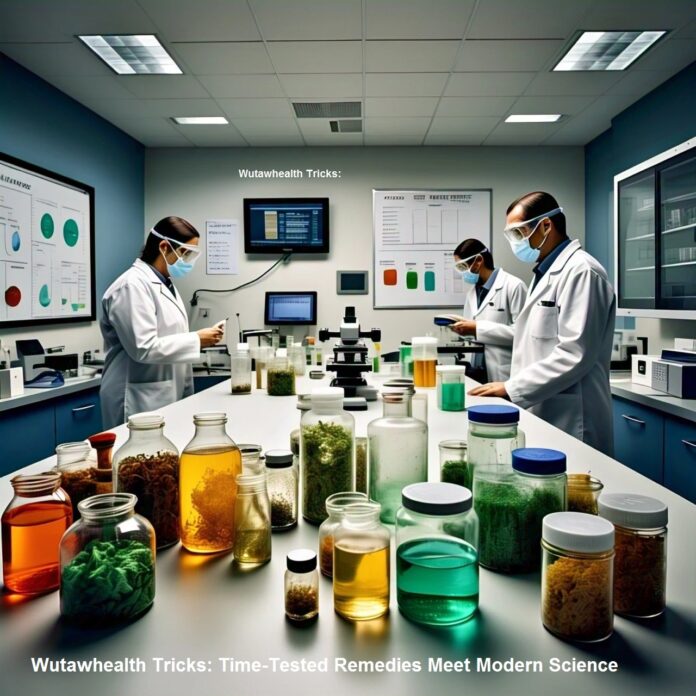Introduction
Archeological evidence shows humans have turned to various natural cures for a plethora of ailments. ‘Wutawhealth Tricks‘ is an attempt to validate and define some of these age-old practices that have received empirical support through modern science. This article is aimed to explore what these tricks are and how they soothe modern age medical complications.
The Wisdom of Traditional Remedies
People have always relied on herbs and spices as a part of their life, be it during illness or in general. Such practices have been influenced by Ayurveda, Traditional Chinese Medicine (TCM) and other indigenous systems all over the globe. The crudeness and length of the practice is due to it’s effectiveness because the sources are primitive yet powerful.
A few ‘unofficial’ remedies include:
- Turmeric Helps With Inflammation: Both Ayurveda and modern day medicine accepts the anti-inflammatory properties of turmeric. Specifically curcumin which is the major ingredient of turmeric.
- Ginger Helps with Digestion: Ginger is recognized as a potent remedy for nausea, bloating and general digestive unease.
- Honey and Lemon Soothes a Sore Throat: A combination of honey and lemon is acknowledged to help ease soreness in the throat and increase defense mechanism of the body.
- Garlic Helps With Immunity: Garlic is popularly known for its antibiotic properties and is known to boost immunity when consumed raw.
- Chamomile for Sleep: Chamomile tea is known for aiding relaxation which helps one to fall asleep.
While these remedies have been used for long, science is beginning to understand how they work.
The Science Behind Traditional Remedies
A number of studies conducted in recent years have validated several natural remedies and their claims related to health while also providing guidelines for their use.
1. Turmeric and Curcumin
Recent studies validate that curcumin, the active constituent in turmeric, is highly anti-inflammatory and an antioxidant. Research indicates that curcumin can assist in controlling arthritis, metabolic syndrome, and even depression by reducing inflammation in the body. However, it is important to note that curcumin has low bioavailability, which means the body absorbs it poorly. It is usually blended with black pepper (piperine) or consumed with fats to increase bioavailability.
2. Ginger for Digestive Health
In a study published in the World Journal of Gastroenterology, scientists found that ginger can speed up gastric emptying, which lowers the severity of bloating and indigestion. Furthermore, ginger has been proven to help reduce nausea, making it useful for motion sickness and morning sickness.
3. Using Lemon and Honey for Sore Throats
Honey is known to help with infections due to its antimicrobial properties, while lemon is important for supporting the immune system because it contains Vitamin C. In children, honey has been demonstrated to be as effective as many cough medications, he said.
4. Immunity Boosters: Garlic
Garlic is known to strengthen the immune system and has antimicrobial properties because it contains a compound known as allicin. A journal article from the Journal of Nutrition stated that the consumption of garlic is known to lessen both the duration and intensity of a cold.
5. Talking About Chamomile and Sleep Problems
An antioxidant known as apigenin is chamomile’s key ingredient, and it attaches itself to certain receptors in the brain which results in relaxation and sleep. Research has shown that chamomile tea can aid sleep, especially in those faced with insomnia or anxiety.
Applying ancient methods: New uses for old remedies
Due to the growing interest in the use of holistic approaches to health, almost all traditional remedies are now being marketed as part of modern wellness products. Here are some ways these practices are slowly filtering into modern medicine:
- Capsules and Extracts: Curcumin, the active ingredient in turmeric, and garlic are now available in capsule form along with ginger making them easier to consume.
- Foods with added Nutrients: Fermented foods high in probiotics as well as lozenges containing honey and turmeric lattes are now preferred dietary selections.
- Aromatherapy and Essential Oils: The use of chamomile, ginger, and eucalyptus essential oils has gained prominence for aiding relaxation and relieving respiratory discomfort.
- Clinical Trials and Research: Researchers are looking into the possibilities of developing safe and effective pharmaceutical formulations based on traditional medicine systems.
How to Safely Incorporate Traditional Remedies
There is no doubt that traditional medicine provides several advantages, but ensuring safe application makes it more effective. Here are some recommendations:
- Consult a Healthcare Provider: Ensure to talk to a doctor before using herbal remedies, especially with existing health issues or ongoing medication.
- Use High-Quality Products: Make sure that the herbs or supplements are obtained from trusted brands that guarantee purity and potency.
- Follow Recommended Dosages: Even the most natural approaches have the potential to be detrimental to one’s health. For instance, garlic has been known to cause an upset stomach, and in excess, ginger can lead to heartburn.
- Be Mindful of Allergies: Certain herbs or other natural substances may cause allergic reactions; therefore, it is advisable to start with small doses or, at the very least, skin patch tests.
The Future of Traditional Remedies in Modern Science
The merging of centuries’ worth of knowledge with modern technology is currently carving the paths we take in clinical medicine. Researchers have not stopped exploring all the possibilities that expanding traditional medicine has to offer. Some noteworthy integrated advances include:
- Personalized Herbal Treatments: There is hope that precision medicine will soon come with genetic and AI-powered profiling to suggest defensive herb treatments for specific conditions deemed tailoring.
- Biologically-Based Herbal Medicine: Innovative approaches to the purification and alteration of active constituents from herbal products for enhanced efficacy is always ongoing.
- Alternative Medicine: Many hospitals, clinics, and wellness centers are adopting integrative medicine which combines treatments with natural therapies that are backed by good research.
Conclusion
Wutawhealth Tricks” exemplifies how centuries’ worth of remedies collide with current scientific advances, showing us that they can be helpful instruments to aid our health. Preparedness needs trust in old age remedies as the foundation but requires science to validate them in their optimal use. Combating the old with the new enables us to achieve a more holistic concern for health that remains effective, practical, and timeless.
Frequently Asked Section (FAS)
Q1: Are traditional remedies safe for everyone?
The majority of these remedies is safe, but they do come with individual differences. It is advisable to talk to your clinician before undergoing herbal medicine. This is especially true for pregnant and nursing mothers as well as for those who are on certain medications.
Q2: Am I able to combine traditional methods of treatment with modern medicine?
Yes, but some caution is advisable. Some herbs might interfere with prescription medication, so it is wise to consult your physician.
Q3: How can I make sure that the herbal supplements are of good quality?
Choose supplements that have undergone testing by independent laboratories and are certified by the USP or NSF.
Q4: Do herbal traditional remedies show any effects instantly?
Unlike synthetic drugs, all-natural remedies often take time to show effects. The consistency in taking them is important in achieving their benefits.
Q5: Is it possible to prepare herbal remedies from the comfort of my home?
Definitely! Several such remedies, including ginger tea and turmeric milk, are not only easy to make but also made from the most basic ingredients found in the kitchen.


